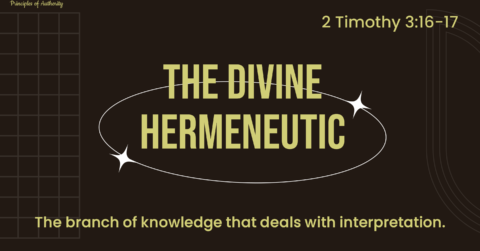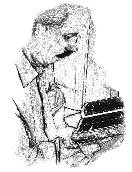Category: Hermeneutics
Subject: Hermeneutics
Sermon: The Divine Hermeneutic

This lesson affirms that while there are many interpretations of scripture that doesn’t mean that all such interpretations are valid. When God spoke, He revealed His will. It is man’s responsibility to examine the scriptures to determine what God meant, not what we want for Him to have said.
Sermon Powerpoint View and Download:
<<———><><———>>
Mining the Scriptures: Revelation 1:1-3

First, a pet peeve. The book is not titled Revelations (plural), it is Revelation, as in “The Revelation of Jesus Christ” (vs. 1). The term “revelation” is taken from the Greek “apokalypsis”, and literally means an unveiling.
What is contained in this book is the Revelation of Jesus Christ, sent to the apostle John by way of a vision. John asserts that what he writes in the book is a faithful testimony of “all things that he saw” (vs. 2).
As John pronounces a benediction upon “he who reads and those who hear”, and “keep those things that are written” in this Revelation, he indicates that the vision in the book concerns events that would soon occur. Note the two phrases: “things which must shortly take place” (vs. 1), and “the time is near” (vs. 3).
The book of Revelation contains many symbols. The style of writing has been referred to as “apocalyptic language,” and requires careful interpretation. It is important to note that the method of interpretation used to successfully divine the meaning of Revelation takes into consideration that the book was written to Christians in that day concerning events which would “shortly take place.”
“Literally” – A Discussion of Definitions
I recently read an interesting short article on the use of the term “literally” that I want to share with you, then comment upon.
Two Misuses of “Literally”
“He literally knocked his head off.” No. If he had, the head would have rolled across the floor, separated from the body. “Literally,” in that case, is mistakenly used to intensify a figure of speech, but “literally” does not intensify the figure. It says “knocked his head off” is not a figure of speech but a true description of what he did.
Another misuse of “literally” has to do with word meaning. Someone says, “proskuneo ‘literally’ means ‘kiss the ground toward.’” No, proskuneo literally means “worship.” “Kiss the ground toward” is its etymology, how the word was formed. It is also an archaic meaning; as ancient Persians did literally fall on their faces and kiss the feet or hem of the robe of their deified kings. Etymology does not determine meaning; usage does. The New Testament frequently says, “They fell down and worshipped him” (Matthew 2:11; e.g.). “Fell down” is from a different original word, “worshipped” is proskuneo.
“Literally” does not intensify a figure. A word’s etymological meaning is not its “literal” meaning.
Cecil May
Preacher Talk (Vol. 27, No. 2—April 2012)
The first misuse of the term “literally” is typical in casual conversation. While irritating to those who are sensitive to the mangling of the English language, it is innocuous. However, defining biblical terms by their etymology, (or even their assigned dictionary definitions), without considering context, is extremely troubling as we seek to interpret God’s word.
Continue reading ““Literally” – A Discussion of Definitions” →
Sermon: Who Is Herman?
Fourth in an ongoing series on authority. This lesson explains what hermeneutics is (the methodological system of interpreting the Bible), and explains that our methodology is not arbitrary or contrived, but is a simple consequence of what the Bible claims to be.
Sermon Powerpoint: Click Here .
Sermon Audio: Click Here .
From the Preacher’s Pen: Scripture Must Be Its Own Interpreter

In reading a debate from 1928 on the subject of Premillennialism, I came across the following from the pen of H. Leo Bole. This is found in his first negative of the proposition, “The Scriptures teach that Israel (fleshly descendant of Abraham through Jacob) shall be nationally restored.”
“… An important rule for the correct understanding of God’s word is this — namely, the Scripture must be its own interpreter. This rule requires that when there is a question concerning the meaning of any Scripture, that the true sense must be searched out and ascertained from other Scriptures that speak more clearly on that point. All Bible scholars recognize two classes of Scriptures–plain and simple Scriptures, and obscure or difficult Scriptures. The obscure and difficult Scriptures must be interpreted by the plain and simple Scriptures.”
(http://www.mun.ca/rels/restmov/texts/rboll/up/UP01N.HTM)
For example, Revelation 20:1-10 should be interpreted with Mark 9:1 in mind. If that is done, the erroneous view that Jesus has yet to establish an earthly 1000 year kingdom will not be seriously considered. This example could be multiplied with the various false doctrines that have troubled religious people throughout the history of the Lord’s church.
![]()
Seeking the Lord

In 1 Chronicles 28, King David called all of the leaders of Israel, (captains, stewards and men of valor), to himself, and explained to them that Solomon had been chosen by God to follow him on his throne, and to build the temple. He told them that God had promised to establish Solomon’s kingdom “forever”, “if he is steadfast to observe My judgments and My commandments, as it is this day” (vs. 7).
In verses 8-10, he first addressed the leaders of Israel, and then Solomon, enjoining them to seek God and His will. Notice the passage:
Now therefore, in the sight of all Israel, the assembly of the LORD, and in the hearing of our God, be careful to seek out all the commandments of the LORD your God, that you may possess this good land, and leave it as an inheritance for your children after you forever. 9 As for you, my son Solomon, know the God of your father, and serve Him with a loyal heart and with a willing mind; for the LORD searches all hearts and understands all the intent of the thoughts. If you seek Him, He will be found by you; but if you forsake Him, He will cast you off forever. 10 Consider now, for the LORD has chosen you to build a house for the sanctuary; be strong, and do it.
The phrase “be careful to seek out all the commandments of the Lord your God” is especially instructive to us.
Sermon: As the Heavens are Higher Than the Earth
Bill Crews’ sermon notes the passage from Isaiah 55:6-11, indicating that God’s wisdom and will are beyond man’s knowledge, outside of His revelation to us.
Sermon Audio: Click Here .
In The News: North Richland Hills church of Christ to Begin Using Instruments in Worship
 On Saturday, February 10, 2007, the Richland Hills church of Christ will begin holding a weekly Saturday evening worship service that will include the use of musical instruments in worship, and an observance of the Lord’s Supper. Jon Jones, (the former “pulpit minister” and one of the elders), said that the elders “fully and completely” endorsed the decision. At an adult Bible study, he said, “There is unity in our eldership, and we are so thankful for that.”
On Saturday, February 10, 2007, the Richland Hills church of Christ will begin holding a weekly Saturday evening worship service that will include the use of musical instruments in worship, and an observance of the Lord’s Supper. Jon Jones, (the former “pulpit minister” and one of the elders), said that the elders “fully and completely” endorsed the decision. At an adult Bible study, he said, “There is unity in our eldership, and we are so thankful for that.”
However, two of the 17 elders serving resigned when the decision was made. Though there seems to be some “politicking” going on, and the two remain members of the congregation, Roger Dean, one of the remaining 15 elders acknowledged that the decision had prompted the two elders to resign.
It Depends on How You Interpret It
 In about 512 B.C., as Darius I of Persia led his armies north of the Black Sea, the Scythians sent him a message comprised of a mouse, a frog, a bird, and five arrows. Darius summoned his captains. “Our victory is assured,” he announced. “These arrows signify that the Scythians will lay down their arms; the mouse means the land of the Scythians will be surrendered to us; the frog means that their rivers and lakes will also be ours; and the Scythian army will fly like a bird from our forces.”
In about 512 B.C., as Darius I of Persia led his armies north of the Black Sea, the Scythians sent him a message comprised of a mouse, a frog, a bird, and five arrows. Darius summoned his captains. “Our victory is assured,” he announced. “These arrows signify that the Scythians will lay down their arms; the mouse means the land of the Scythians will be surrendered to us; the frog means that their rivers and lakes will also be ours; and the Scythian army will fly like a bird from our forces.”
But an adviser to Darius said, “The Scythians mean by these things that unless you turn into birds and fly away, or into frogs and hide in the waters, or into mice and burrow for safety in the ground, you will all be slain by the Scythian archers.” Darius took counsel and decided that the second was the right interpretation, and beat a retreat!
Today in the Word, January 1992, p.22.
It does matter how you interpret scripture. There is the true interpretation of a passage, and then there are other interpretations which men assert to their own peril. We can know the truth, but we must set aside our own preconceptions, and let the word of God say what it says! “These were more fair-minded than those in Thessalonica, in that they received the word with all readiness, and searched the Scriptures daily to find out whether these things were so” (Acts 17:11).




